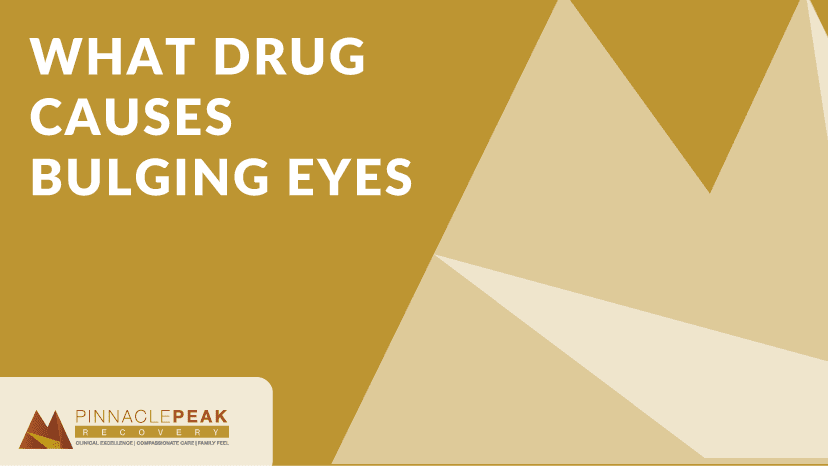Most people are aware that substance use affects a person’s eyes. You might know that marijuana can cause bloodshot eyes, or that tobacco smoke can irritate a person’s eyes. However, there are many other effects that substance use can have on the eye. Some of these, like red eyes from marijuana use, are short-term and will clear up on their one. However, more long-term effects on a person’s eyes are common with extended substance use.

Cocaine use affects the eyes in many ways. One of the ways is by causing a person’s pupils to dilate significantly. Large pupils resulting from cocaine use can cause a person to appear to have bulging eyes.
The University of Arizona shares that 165 million people in the United States are currently involved in some form of substance misuse. Understanding the possible impact on various parts of the body, including a person’s eyes, is important. Those who are ready to pursue treatment for substance use can be assured that ending substance use will greatly improve their overall health.
What Is Cocaine?
Cocaine is made from a plant called coca which is native to South America. Cocaine is a stimulant, which means it causes an energy boost and increased positive feelings for a short burst of time. Most people use mild stimulants like caffeine and ginseng every day, but Cocaine is powerful enough to cause serious side effects over time. Cocaine causes a person’s body to produce a significant amount of dopamine into parts of the brain that cause pleasure.
Some of the short-term side effects of cocaine use are:
- Decreased appetite
- Extreme sensitivity to touch, sound, and sight
- Intense feelings of happiness
- Paranoia
- Anger/irritability
Long-term cocaine use contributes to health issues such as:
- Frequent headaches
- Stroke
- Altered mood
- Heart disease
- Heart attack
- Sexual performance issues
- Seizures
- Lung damage
- Bowel decay
Cocaine’s Effects on the Eyes
Enlarged pupils
Enlarged pupils due to cocaine use are sometimes called cocaine eyes. Typically, large pupils are caused by low light. The pupil dilates so that the eye can see more clearly in low-light settings. However, pupils also dilate when a person is scared. This happens due to the release of a neurotransmitter called norepinephrine. Cocaine use releases norepinephrine, giving a person larger pupils and the appearance of bulging eyes.
Keratitis
Keratitis is the inflammation of the cornea. Cocaine use causes this issue, but it can also be caused by infection or improperly wearing contact lenses. Keratitis can cause a temporary or permanent reduction in a person’s vision, inflammation, scarring, and in some cases blindness.
Endophthalmitis
Endophthalmitis is an eye infection resulting from bacteria or fungus. It sometimes happens in cocaine users who inject cocaine with needles. This condition causes intense pain, red eyes, sensitivity to light, discharge from the eyes, and impaired vision. These symptoms will worsen until a person receives treatment.
Glaucoma
Glaucoma is caused by raised blood pressure. Because elevated blood pressure is a symptom of cocaine use, it is possible for cocaine to cause glaucoma. Typically glaucoma affects people over 60 years old, but it can affect anyone. Vision loss due to glaucoma can not be recovered.
Maculopathy
Maculopathy is also called macular degeneration. Over time, people with maculopathy lose their ability to see fine details, such as small words on a page or the distinguishing characteristics of a person’s face.
Ocular bone damage
Those who use cocaine and other substances by snorting can cause damage to a person’s nasal passages. Over time, cocaine use in this manner can damage the bones around a person’s eye.
Nystagmus
Nystagmus is a condition where a person can not control their eye movements. It is sometimes called dancing eye. Along with cocaine use, nystagmus can be caused by certain prescription medications, alcohol use, head injuries, or inner ear problems. In some cases, medication or surgery can improve the conditions of nystagmus. Ending substance use can also relieve symptoms.
Talc Retinopathy
Individuals who use cocaine and other substances via snorting or needles are at risk of developing talc retinopathy. This condition is a yellow or white crystal-like buildup on a person’s vascular tissue.
Yellow colored eyes
Yellow-colored eyes are an indication of jaundice. Jaundice means a person’s liver or bile ducts are not working properly. Because of the way cocaine affects the liver, it is possible for cocaine use to cause jaundice.
Have A Famliy Member Suffering From Cocaine addiction?
Give Us A Call Today!
Getting Help for Bulging Eyes
If you are experiencing bulging eyes or other eye problems from cocaine use, you should seek help as soon as possible. Certain surgeries or medications can reduce or correct many of the eye issues associated with cocaine use. In some cases, simply changing a person’s glasses prescription can have positive effects.
Ending cocaine use is one of the most powerful treatments for conditions caused by cocaine use. In many cases, ending cocaine use will allow a person’s eyes to regain much of their previous effectiveness.
What Happens if Eyes Go Untreated
There are many negative consequences associated with leaving eye conditions untreated. A person can experience reduced vision. Over time, it is possible to go blind due to cocaine-related eye conditions. Some of the eye infections related to cocaine use can cause death if they are allowed to spread.
Treatment For Cocaine Use
Developing cocaine eyes or other eye conditions related to cocaine use might feel scary, but it might be the motivation you need to end cocaine use and pursue wellness. Pinnacle Peak offers cocaine use disorder treatment that can help you find recovery.
Detox is the first step of treatment for cocaine use disorder. During detox, you will benefit from experienced staff who can help you overcome cocaine withdrawal symptoms. Withdrawal symptoms are symptoms resulting from the end of substance use. Withdrawal symptoms last for about a week and are the result of a person’s body adjusting to the absence of cocaine. Withdrawal symptoms that occur when cocaine use is ended include:
- Cravings
- Fatigue
- Irritability
- Nightmares
- Insomnia
- Depression
- Anxiety
- Paranoia
Even though withdrawal from cocaine is not life-threatening, there are good reasons to detox in a treatment facility. Withdrawal symptoms are often difficult to endure. Some people return to cocaine use just to make these symptoms end. In a treatment facility, you will not have access to cocaine, eliminating the temptation to use cocaine and restarting the process. Also, in a treatment facility, you will have access to 24/7 care. Staff at a treatment facility will know how to treat your withdrawal symptoms and make you more comfortable.
Residential treatment is often the next step for a person seeking recovery from cocaine use. In residential treatment, a person seeking recovery will live full-time at a treatment center. At the center, a person will participate in treatments designed to provide education, support, and increase wellness. Substance use often has roots in trauma or poor mental health. In residential treatment, therapists can work with you to address the root causes of your cocaine use, and teach you how to cope in healthy ways.
After residential treatment, many individuals transition to outpatient treatment. Outpatient treatment involves the same therapeutic approach as inpatient treatment, but without living onsite at a treatment center. For some, outpatient treatment is a better overall option for them as they receive treatment while working or caring for children. Outpatient treatment allows for flexibility. Staff at your treatment center will work with you to determine the right level of treatment for you to successfully overcome cocaine use disorder!
Want To Help A Loved One With Their Cocaine Addiction?
Give Us A Call !
Get Treatment For Cocaine Use At Pinnacle Peak Recovery!
Is cocaine affecting your eyes or causing other health problems? It may be time to seek recovery. At Pinnacle Peak, we are passionate about partnering with you to achieve your recovery goals. Our staff creates individualized recovery plans that treat the whole person. If you area ready to achieve wellness and start cocaine addiction treatment, contact Pinnacle Peak today at 866-377-4761 for more information.

